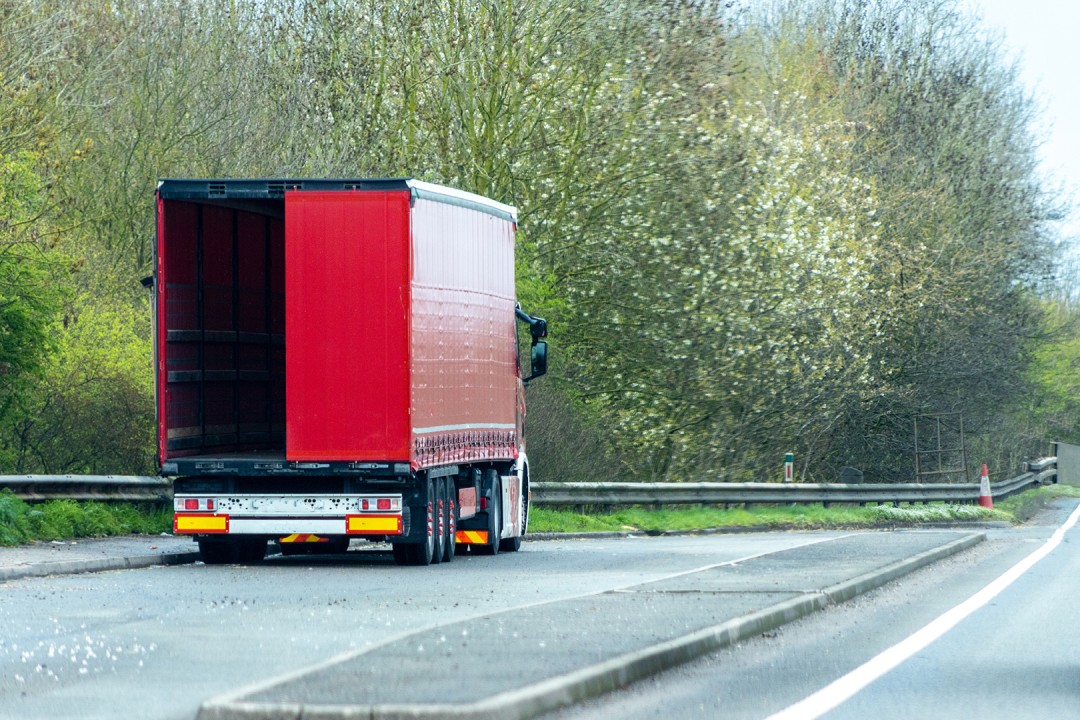
Susie Jones
¿Los conductores prefieren los aparcamientos a las estaciones de servicio?
Creado: 19/08/2024
•
Actualizado: 19/08/2024
En 2022, en el Reino Unido se registraron más de 5.000 denuncias de delitos contra el transporte de mercancías, lo que supuso una pérdida de aproximadamente 66 millones de libras. El aumento de los delitos contra la carga supone una amenaza crítica para las cadenas de suministro, las empresas y los consumidores, lo que causa una gran preocupación en el sector del transporte.
Según un informe publicado por la policía de Cambridgeshire, el 46% de todos los robos de carga se producen en calles y aparcamientos, y el 27% en estaciones de servicio. A pesar de ello, la escucha social demuestra que muchos conductores siguen aparcando en los apartaderos por diversos motivos.
Los problemas del aparcamiento en un apartadero
Para los conductores, aparcar durante la noche en un apartadero suele ser la opción más sencilla y económica. Sin embargo, presenta varios inconvenientes que pueden repercutir negativamente en la salud mental y la seguridad del conductor.
Instalaciones - Los conductores necesitan más instalaciones, como aseos, duchas y comida. La falta de instalaciones limpias puede aumentar la incomodidad e influir negativamente en el sueño, la concentración y la salud mental.
Seguridad de los conductores - El estacionamiento en zonas de descanso supone un riesgo añadido para la seguridad de los conductores. Según un estudio de la AA, dos tercios de los accidentes mortales en los que se vieron implicados vehículos parados en una autovía se produjeron en apartaderos, y más de la mitad de los vehículos afectados eran camiones.
Robo de carga - El sector experimentó un aumento del 380% en el robo de carga entre junio y julio de 2023, lo que pone de manifiesto la necesidad de aparcamientos seguros. Con ladrones oportunistas en los aparcamientos, los conductores corren el riesgo de perder su carga y las flotas, millones de libras.
Por qué los conductores aparcan en apartaderos
A pesar de los riesgos, la escucha social realizada a través de Facebook sugirió que el 70% de los conductores se mostraban menos inclinados a elegir un aparcamiento para camiones que un apartadero por varias razones:
Seguridad
Los comentarios en las redes sociales sugieren que el 43% de los camioneros optan por no aparcar en una parada de camiones o estación de servicio debido a la falta de medidas de seguridad.
"Sólo aparco en apartaderos o polígonos industriales. Cuando he aparcado en servicios/paradas de camiones, me han cortado las cortinas", afirma el camionero Luke.
La seguridad de las paradas de camiones en todo el Reino Unido ha sido un tema candente de debate en el sector del transporte, en el que los conductores han solicitado más apoyo del Gobierno para proporcionar instalaciones de seguridad adicionales. Según comentarios anteriores, los conductores querían que el [gravamen para vehículos pesados] (https://motortransport.co.uk/industry-news/drivers-want-hgv-levy-funds-spent-on-truck-stops/17658.article) se invirtiera en aparcamientos más seguros, higiénicos y asequibles.
En las redes sociales, el 59% de los camioneros afirmaron que el Reino Unido carecía de suficientes paradas de camiones seguras en comparación con Europa. Una opinión respaldada por los comentarios de SNAP's Truck Park Tour, donde el 31% de los conductores europeos afirmaron que se beneficiaban más del acceso a las ubicaciones exclusivas y seguras de SNAP. La organización de seguridad TAPA goza de un amplio reconocimiento en Europa, con muchos emplazamientos que cuentan con certificaciones de nivel 1, 2 ó 3.
Por el contrario, en el Reino Unido sólo hay dos locales con certificación TAPA, acreditados por auditores autorizados con formación SNAP PSR de nivel 3. Formula Services y The Red Lion cuentan con una certificación de nivel 3, con un delito denunciado en The Red Lion y ninguno en Formula Services, a pesar de su ubicación en una zona de alta criminalidad.
Markus Prinz, Director Senior de Normas, Formación y Certificación de TAPA, explica: "Apoyamos plenamente todas las actividades encaminadas a garantizar una infraestructura de aparcamiento eficiente y segura para camiones y a mejorar la seguridad de los conductores de camiones, los vehículos y la carga. Al proporcionar un ecosistema abierto para la optimización técnica y económica del estacionamiento seguro de camiones, creemos que se puede impulsar la transición hacia el estacionamiento seguro de camiones."
Reticencia de la empresa
El 30% de los conductores declararon que sus empresas de flotas no estaban dispuestas a pagar paradas de camiones o estaciones de servicio. Un conductor explicó:
"Cada vez menos empresas, por desgracia, pagan por el aparcamiento nocturno, las instalaciones permanecen abiertas por los pelos, recortan personal para hacer frente a las facturas y entran menos aparcamientos".
Paradas de camiones al máximo de su capacidad
"Se puede saber qué paradas tienen seguridad, ya que están llenas a las 6 de la tarde".
El 70% de los conductores expresaron su frustración por el hecho de que las paradas de camiones seguras estuvieran al máximo de su capacidad, lo que no les dejaba otra opción que aparcar en un apartadero. Los comentarios del Truck Park Tour fueron similares: muchos expresaron su preocupación por el hecho de que los aparcamientos del Reino Unido estuvieran llenos antes de llegar.
Los datos de la encuesta de TfL sobre el estacionamiento de camiones en 2022 indican que, a pesar de un aumento del 12% de la capacidad in situ entre 2017 y 2022, no es suficiente para soportar el aumento del 21% de vehículos en el mismo periodo.

Reducir el estacionamiento nocturno en apartaderos
Financiación pública
El 18% de los conductores querían ver más financiación del Gobierno para apoyar las instalaciones de seguridad. En septiembre de 2023, el Departamento de Transporte concedió 8 millones de libras a 39 instalaciones en carretera en toda Inglaterra para mejorar las instalaciones y la seguridad. El equipo de Acceso y Seguridad de SNAP está empezando a apoyar a las empresas que obtuvieron financiación poniendo en marcha sus mejoras. Se dispone de más financiación, hasta 100 millones de libras esterlinas, hasta 2025, en virtud del plan de cofinanciación del Gobierno.
Instalaciones de seguridad
Para ofrecer una zona segura a los camioneros, las paradas de camiones pueden invertir en sólidas instalaciones de seguridad: productos como CCTV, ANPR, interfonía, barreras y quioscos refuerzan la seguridad del lugar y disuaden de la actividad delictiva. SNAP Access & Security combina productos de seguridad a medida y experiencia en el mercado para proteger a las personas, los vehículos y el contenido de las paradas de camiones.
¿Pueden los camioneros dormir al borde de la carretera en el Reino Unido?
Desde el 1 de noviembre de 2017, la DVSA ha puesto en marcha nuevas normas y reglamentos relativos al descanso de los conductores en lugares como zonas residenciales y apartaderos. Los conductores podrían ser multados con hasta 300 libras si pasan su descanso en un apartadero o a un lado de la carretera.
¿Cómo se mantienen despiertos los camioneros mientras conducen?
Los conductores de camiones deben seguir las normas de descanso del tacógrafo por su seguridad y la de todos los demás en la carretera. La finalidad del tacógrafo es evitar la fatiga del conductor y garantizar que conductores y empresarios respeten las normas.
A pesar de ello, evitar el aburrimiento y la fatiga en la carretera es un reto para muchos conductores y puede afectar a su bienestar. La mayoría de los conductores prefieren escuchar música y podcasts mientras están en la carretera y prosperan gracias a la interacción social con otros conductores en las paradas de camiones y estaciones de servicio.
¿Están autorizados los camioneros a llevar pasajeros en el Reino Unido?
El camionero medio pasa unas 12 horas al día al volante. Para combatir la soledad y el aburrimiento, los conductores pueden llevar pasajeros si siguen las normas específicas establecidas por la FMSCA. Los conductores deben obtener una autorización por escrito de su empresa presentando una solicitud de pasajero; en esta solicitud debe constar la duración del viaje y las fechas.
Los requisitos comunes son los siguientes - Las pasajeras no deben estar embarazadas
No deben padecer enfermedades graves o crónicas
Deben tener diez años o más
Se requiere seguro médico.


